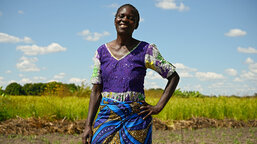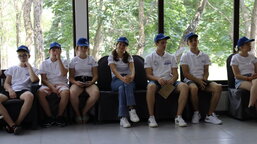Loredana and Nicoleta, two young activists from Moldova, met along a shared journey that led them towards active community involvement. Through its new initiative, Caritas Czech Republic has inspired 80 young people to engage in community, guiding them to build bridges between generations. 20-year-old Loredana and 17-year-old Nicoleta shared with us their intergenerational experiences and common aspirations for a better future.
How did you learn about Caritas Czech Republic, and why did you decide to get involved in the social activism project?
Loredana: I learned about Caritas Czech Republic from a friend who guaranteed that I’ll get a beautiful experience, new friends, valuable knowledge, and memorable moments. I decided to join Caritas Czech Republic's social activism initiative to contribute positively to the development of our society and encourage the involvement of young people in various actions for the well-being and balance of all.
Nicoleta: I found out about the project from our local youth coordinator, Corina Țîcu. I joined happily and without hesitation, as I am an active young person who wants to contribute to my community.
You have already had various meetings, including intergenerational meetings with people of different ages, within the initiative. How has this experience been, and what challenges have you encountered?
Loredana: Interacting with people of different generations was challenging for me as I am quite emotional, and elderly people touch my heart. I was motivated by the fact that I hadn't taken advantage of spending enough time with my grandparents while they were alive. I was impressed by the intellectual potential of the generation untouched by technology, which managed to survive the imprints of historical events. I had the opportunity to interact with a former teacher from the high school I graduated from, who enthusiastically shared her passion for teaching and mathematics.
Nicoleta: Interacting with people of different generations interested me because of the possibility of getting to know them, learn about their life stories, and get more advice from them as people who have lived through various life experiences.
How do you perceive the relationship between young people and elderly people in your communities?
Loredana: Unfortunately, in my community, the relationship between young people and elderly people is quite distant. Elderly people are often perceived as a burden, and this perspective needs to be changed through more understanding and reciprocal interaction.
Nicoleta: Unfortunately, the relationships are not as close as both parties would like, either because of a shortage of time or a lack of awareness that such connections can be beneficial for everyone.
How do you think this relationship can be improved?
Nicoleta: The relationship can be improved through awareness campaigns about the needs and experiences of elderly people. Young people can contribute by organising meetings and providing assistance in their daily activities. They could systematically visit elderly people in the community and provide the essential help they need, even if it is just to talk to them so that they don’t feel lonely.
Loredana: Young people can promote volunteering and organise actions to improve the quality of life for elderly people. Spreading information about these actions on social networks can attract more volunteers. Additionally, young people can mobilise to collect necessary items to distribute to the elderly people who need assistance. They can also organise board games, various dances, or even help them with various activities around the house.
Young people also often face various difficulties. What do you think are the biggest issues for young people in your community and how can they be solved?
Loredana: Stereotypes and prejudices are a major problem. Young people are often judged solely on their appearance, and it's crucial to initiate a shift in these mindsets, beginning with schools.
Nicoleta: Education in schools plays a crucial role. Students need to be educated not to conform to stereotypes, but to fight against them.
Have you participated in the awareness campaign on social activism? How did people react when you explained to them what social activism means?
Nicoleta: Locals were very attentive and interested in what we were telling them. They responded affirmatively and showed a high interest in getting involved in solving social issues.
Loredana: We saw that people were enthusiastic and curious. They were eager to learn more about social activism and how it could improve their lives.
What skills do you think are essential for a young person involved in community development?
Loredana: Civic spirit, initiative, persuasion, time management, devotion to the community, and a desire to bring about positive change.
Nicoleta: Responsibility, perseverance, activism, empathy.
How do you think the experience gained in this initiative will help you in the future?
Nicoleta: This experience will help me in personal development. I've learned many things that I didn't know before about social activism, advocacy or awareness campaigns.
Loredana: This experience has contributed to the development of my civic spirit. It has fuelled my desire to investigate the gaps in our society and the revolutionary methods for addressing the most serious and common problems.
Nicoleta and Loredana's perspectives highlight that intergenerational interactions, community activities, and the desire to learn are key elements in shaping a better future. Caritas Czech Republic contributes to this future by empowering and guiding young individuals eager to build more united and prosperous communities in Moldova.










